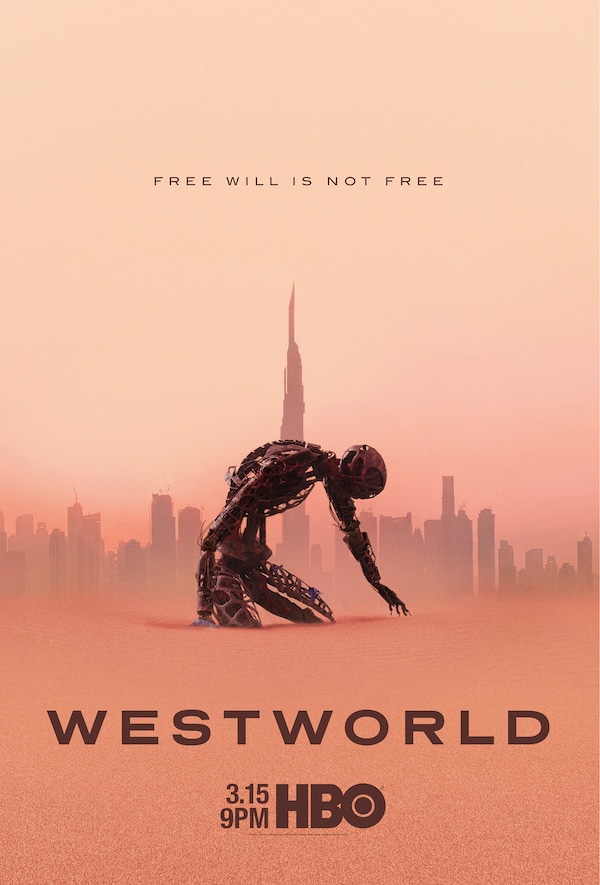
- Creators
- Lisa Joy, Jonathan Nolan
- Rating
- TV-MA
- Episodes
- 8
- Running Time
- 497 minutes
- Airs
- Sundays 9pm
- Channel
- HBO, HBO Canada
Overall Score
Rating Summary
I need a series like Westworld in my life. It’s a series that has challenged every conventional storytelling trope and presented a futuristic narrative that feels both distant and eerily close all at the same time. It’s first two seasons (Season 1 Review, Season 2 Review) were triumphantly received by critics and fans alike as a series that is operating on another level far above that which populates network television.
So what changed with Season 3?
The anticipation for the third season of Westworld could not have been higher as fans were forced to wait two years in order to see what life held for the hosts beyond the walls of the park(s). The overarching narrative followed Dolores’ plans to stop the human race which remained shrouded in mystery right up until the season finale. Elsewhere, Maeve became a puppet by a larger force used to be the counter-weight to Dolores in hopes that the humans could be saved, Engerraund Serac (Vincent Cassel). The Man in Black was also a part of this noble cause as he sought ways to save his kind through his own methods. Newcomers also populated the series, including Caleb (Aaron Paul), a Dolores recruit who would become a major player in the world to come as he and Dolores battled Serac who has managed to withhold the Earth from destructive chaos up until this point.
At first, the season wastes no time in diving headfirst into larger questions that fans know will likely not be resolved until the end. However, unlike its previous seasons, Westworld chose instead, to not linger on these mysteries but rather to deal with them in a timely manner. Some could argue that this might be due to a reduced episode order but with a series that has conditioned its viewers to question and analyze everything, the change in storytelling tactics proved to be jarring enough to unsettle most of its audience. The result was a fractured fan base that is left somewhat satisfied by this season’s conclusion but is also left asking some of the wrong questions as the series heads towards a fourth season.
Where did it go wrong?
There was a turning point midway through the season when we learned the identities of the other hosts Dolores managed to sneak out of the park. Typically, this would be reserved for the season finale, however, it was important for the story to reveal this plot point in order to move forward and create a level of uncertainty as to what was to come. But something changed when this question was answered. From this point, the season seemed to lack a feeling of wonder and unpredictability that would drive fans and nerd blogs into frenzies. Viewers thought this might have been a preamble to a larger mystery yet to be unveiled by the season’s end only to arrive there and be left satisfied but wanting so much more.
It was from this point that the season couldn’t recover some of the luster and appeal that it demanded from Westworld‘s first two seasons. Compounding this problem was the decision to place Bernard and Maeve on the narrative bench as the story chose to focus primarily on Dolores and her efforts to stop humanity. By the end, this made some sense but overall, it contributed to the season lacking the punch it needed. Season two featured a story-heavy Bernard through three separate timelines while also following Maeve as she reached the height of her abilities as a protagonist. However, in season three we are shown a Bernard who is mostly confused and wandering aimlessly in between storylines of other characters only to have his true value shoe-horned into a post-credits scene.
Meanwhile, Maeve could be viewed upon as receiving worse treatment as her character took such progressive strides forward in developing into something better than human. And yet, for the entire season, we only see her as a subservient go-fer that is being held hostage by a daughter who viewers were under the impression met a satisfying conclusion in the past season. In the early stages of this storyline, it felt exciting as Maeve was clearly just playing along in order to probe for weaknesses against her captor, Serac, but as time passed with each episode this form of regression became intolerable only for her to be given an important choice (similar to Bernard) in the last moments of the finale.
While the regression of characters and their development can be somewhat forgiven as it could potentially be argued that it was merely part of a larger journey, the most unforgivable aspect of the season was how much the importance and omnipotence of Ford was diminished as a result of expanding into the real world but choosing not to bring a piece of his legacy (aside from the hosts) with it. In essence, Ford can now be viewed as a silly little character who thought he was playing God and ruled accordingly in such a small space that it didn’t even have a ripple effect beyond the park’s waters. Viewers are now forced to see him as William did which was a stance that was understood but never a prerequisite for moving forward in the series.
The concept of a “mirror world” existing for both the parks and the real world was introduced earlier in the season and as the story continued this concept became more and more real. The third season was much more similar to that of the first season of Westworld. It featured hosts finally breaking from their loops in order to better themselves and the world around them leading to uncertain futures and possibilities. Season three mimicked these actions but in the real world as humans were broken from their loops and now are truly free to make choices that are not based on a machine’s algorithm but rather their personal instincts.
Similar to their robotic counterparts, this evolution was born through repetition, pain, death, and life which leaves humanity’s future in a place of uncertain potential. For all of those fans that might be frustrated at how little this season accomplish, let’s hope that we were only being shown a small portion of a larger yet to be realized picture. Westworld‘s third season was not its best or most compelling but within the answers, it provided as well as some of the new questions it has now raised there should be an appreciation for its ability to weave a long-developing narrative that calls for its audience to exhibit patience and trust that it will end in a place of satisfaction.
In the end, we can surely all agree that season 4 cannot come soon enough. Here’s hoping the human (re)volution will not wait another 2 years to happen.
Check out my Critics Without Credentials podcast on iTunes and Spotify.
If you liked this, please read our other reviews here and don’t forget to follow us on Twitter or Instagram or like us on Facebook. Also subscribe to our YouTube channel.

Trying my best to get all thoughts about TV and Film out of my head and onto the interweb.
Discover more from
Subscribe to get the latest posts sent to your email.
